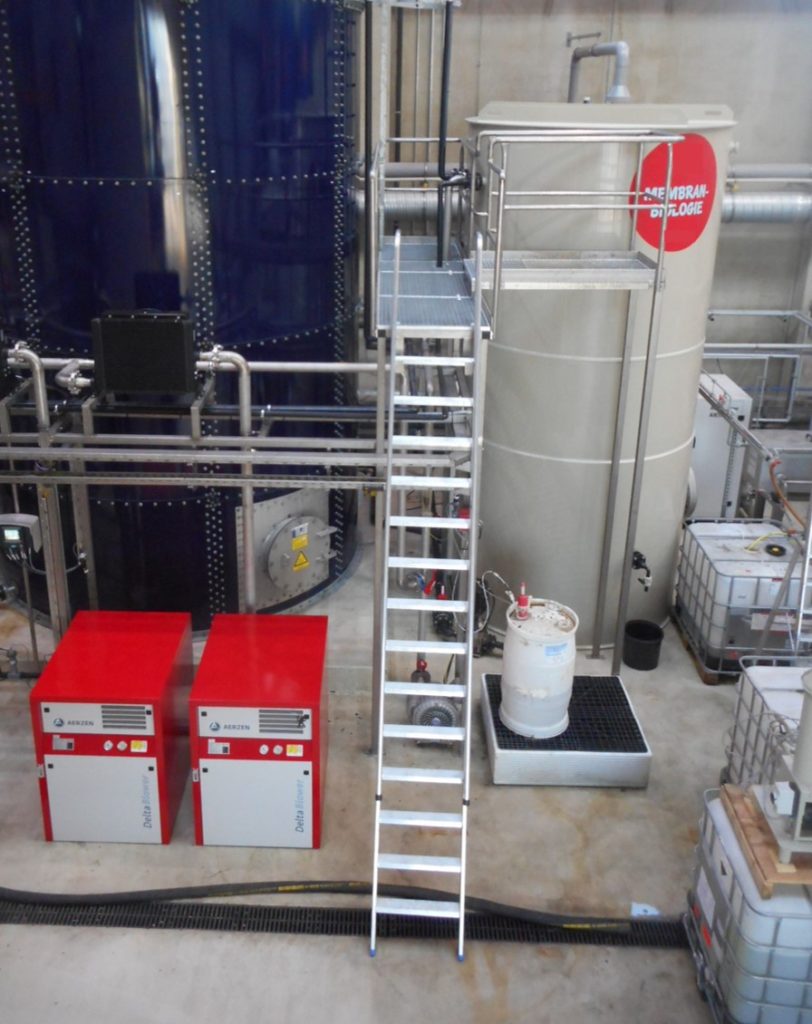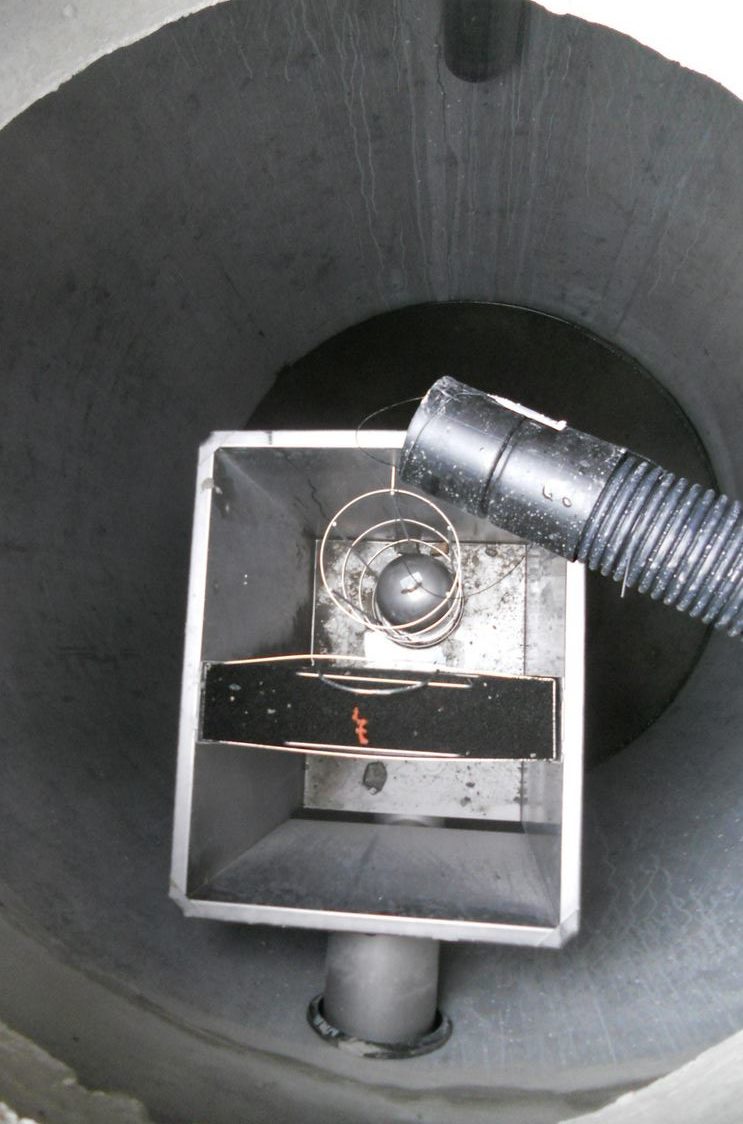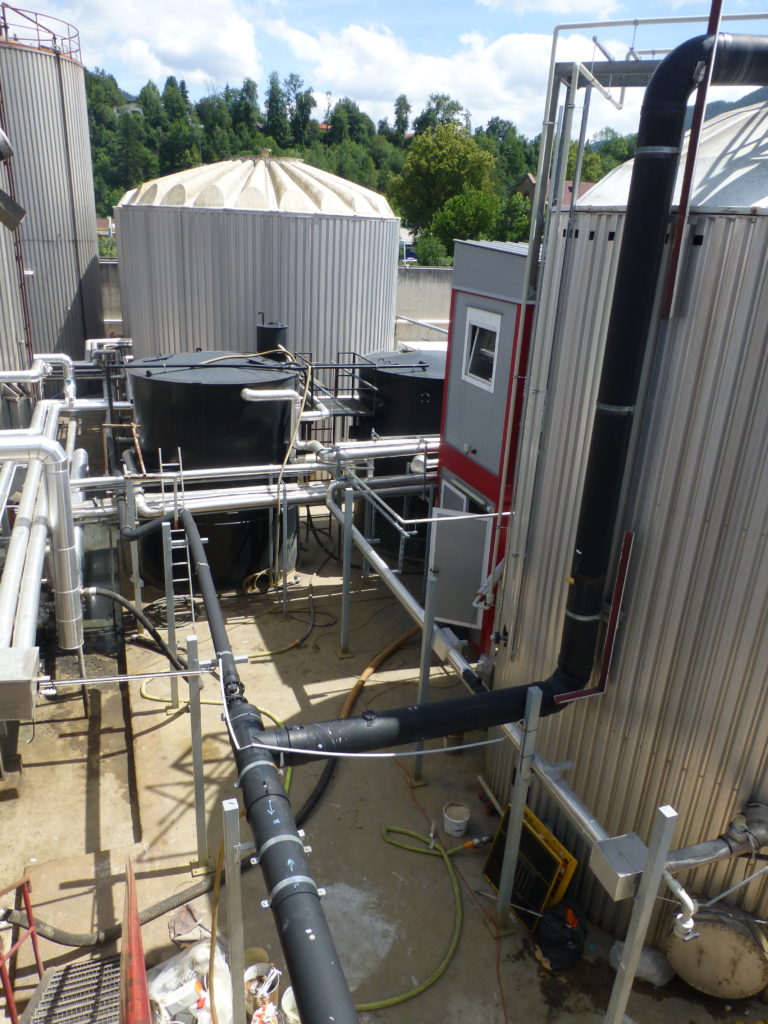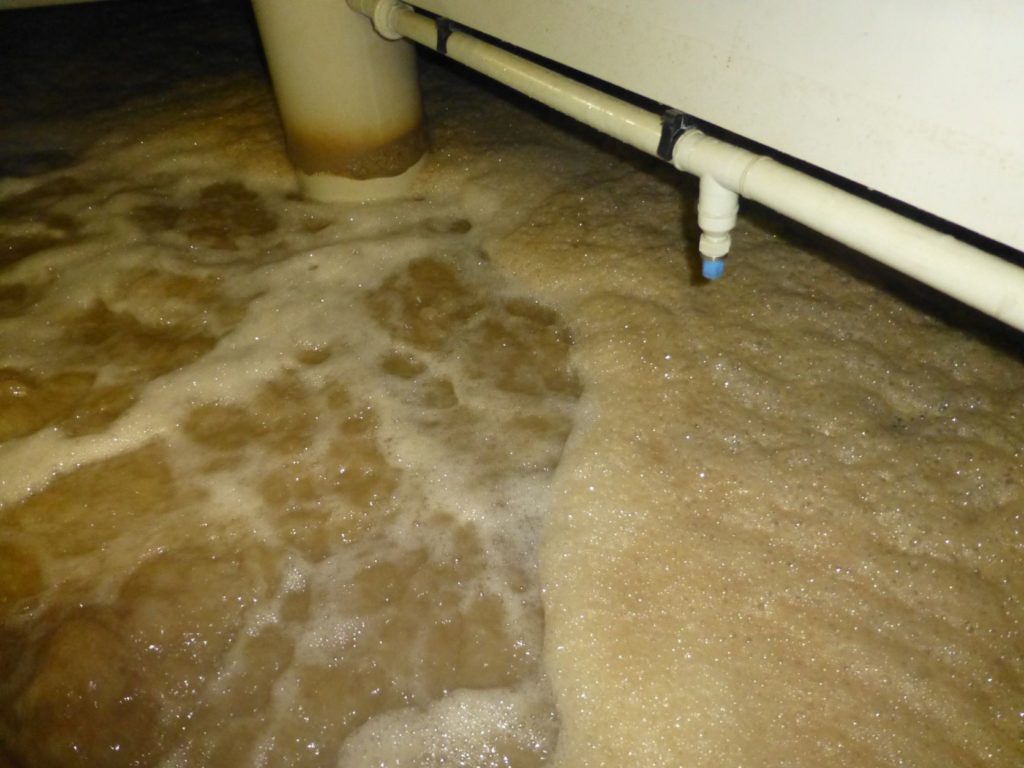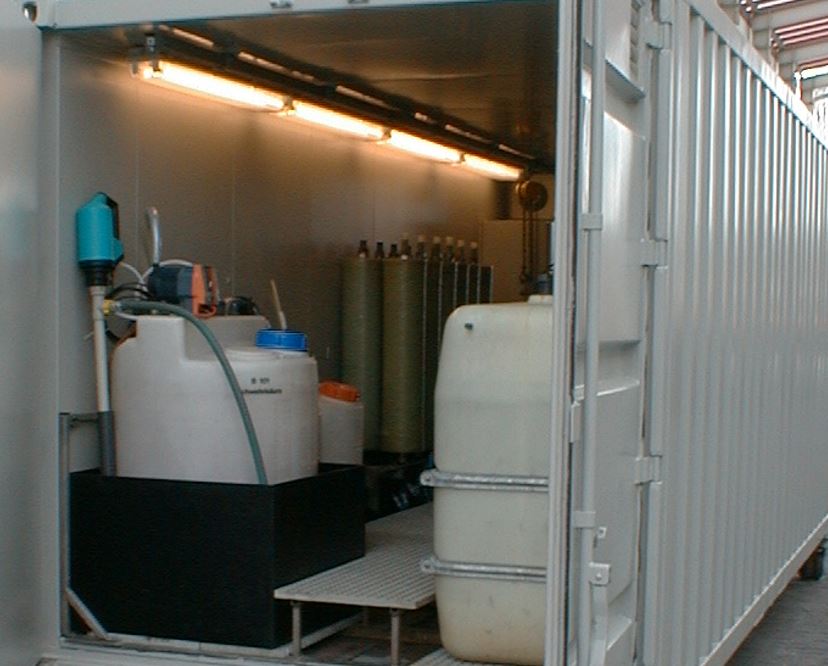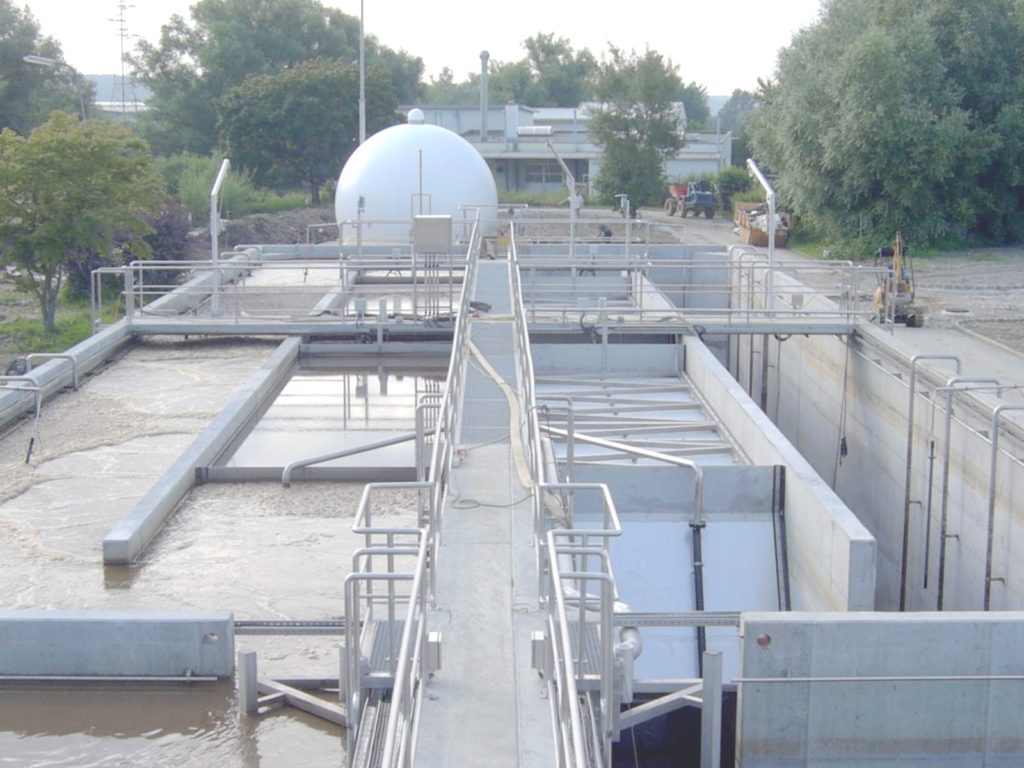References Waste water

EnviCare ® Engineering GmbH relies on a variety of process engineering solutions in the field of industrial and municipal sewage treatment. Especially in the innovative and future-oriented area of membrane technology and the biotechnological processes linked to it, we support our customers in the development and implementation of new processes and of course also in the commissioning and optimization during operation.
MBR plant as a sub-process of liquid waste treatment
Client : Waste processors and collectors
Period : 2015-2018
Services : Test planning and support, planning of the large-scale plant, approval procedures, implementation support, commissioning, operational support
In a waste treatment plant, liquid wastes (e.g. oil-water mixtures, emulsions) are processed, generating evaporator distillates and the effluent from flotation plants. This sewage contains organic substances. The MBR plant is used as a subsequent purification step to achieve indirect discharge quality of the sewage.
EnviCare ® planned and supervised a pilot test at the beginning. The results were used as the basis for designing the large-scale plant. The approval project for the entire treatment plant was prepared and the process was supervised. After successful approval, the implementation and commissioning were accompanied and since then the ongoing operation.
- Further information (file for download).
- Contribution to the ÖWAV seminar at the Vienna University of Technology: ” Use of the membrane bioreactor process in Austrian industry: case studies and limits ” (Mayr, 2017)
Indirect discharger survey and consultation
Client : Sewage associations and municipalities
Period : ongoing since 1999
Services : Survey and consultation regarding indirect dischargers
Companies discharging sewage that deviates more than slightly from domestic waste water in terms of quality require a declaration of consent from the sewerage company in accordance with Annex C of the Indirect Discharger Ordinance. The basis for decision is build uppon an expertly prepared project and an assessment report for all relevant companies in the sewerage area. In addition, certain partial flows may also be subject to a water law permit.
EnviCare ® supports the sewerage companies in the survey process and is available to advise the sewerage companies and also the indirect discharging companies in the preparation of consent declarations.
Surface water purification from waste treatment plants with an MBR facility
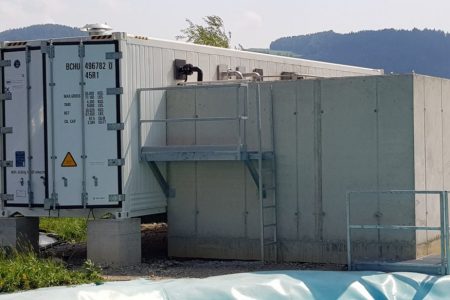
Client : Waste collectors and processors
Period : 2016-2021
Services : Test planning and support, planning of the large-scale plant, approval procedures, implementation support, commissioning, operational support
In numerous waste treatment plants and waste management centres, waste is also stored outdoors on dense surfaces. The polluted precipitation water (contact water) is mostly heavily contaminated organically. Therefore, it must be reliably cleaned to below the specified limits before being discharged. The naturally strongly fluctuating quantity and quality of the contact water do not allow any conventional, sedimenting or floating biological purification. The biological-physical cleaning process in the form of a membrane bioreactor system (MBR system) is used to ensure the quality of the direct discharger.
Further information on membrane bioreactor plants is provided on the page “Membrane bioreactors“.
At two waste treatment companies, EnviCare ® supervised an attempt to clean the surface water with an MBR system, based on these results a large-scale system was planned and the approval project was drawn up. After successful approval, the implementation and commissioning and since then the ongoing operation have been accompanied.
- Further information (file for download).
- Conference paper at the 15th Recy&DepoTech 2020 (virtual conference): ” Membrane bioreactor for cleaning surface water of a waste treatment plant ” (Mayr & Garstenauer, 2020)
Upgrading of the existing biological cleaning stage of an industrial waste treatment plant
Client : Waste collectors and processors
Period : 2017-2018
Services : assessment of the inventory, concept development, basic and detail engineering, inquiries to executing companies, construction supervision, commissioning management, documentation
The biology waste water treatment was essentially established in 1989 and was carried out in two stages, situated outdoors and isolated. The sludge retention takes place via so-called settling cyclones. The biological stage was fed with waste water from a chemical-physical plant for inorganic waste (CPA plant), an organic splitting plant for organic waste water, an evaporation plant, an ultrafiltration plant, a batch treatment of waste water, liquid concentrates and thin sludge from a neutralisation plant with a total daily volume of up to 100 m³. The limit values for indirect discharge could not be reliably complied with.
EnviCare ® developed three variants to adapt to the state of the art. Following a decision by the customer, the detailed planning of the refurbishment and a control concept were drawn up for the customer’s preferred variant, the construction work was supervised and the commissioning was managed.
MBR plant in Food Production
Client : Austrian industrial company
Period : 2007-2008
Services : Detailed planning and test supervision of the pilot plant up to the modification of the wastewater treatment plant
The sewage from the food production company is biologically cleaned in a company waste water treatment plant before it is discharged into the public sewage system. In order to increase the performance of the existing system, a concept for the integration of membrane filtration – a so-called membrane bioreactor – was developed for the site. A pilot plant was used to determine the fundamental suitability of the process and to establish the basis for the design of the large-scale plant.
MBR wastewater treatment at a metal processing plant
Client : Metal processing company
Period : 2017-2021
Services : Test planning and support, planning of the large-scale plant, approval procedures, implementation support, commissioning, operational support
In the electroplating industry, waste water is generated during the surface treatment of metal products. The first treatment steps are flocculation and precipitation. The filtrate of the downstream chamber filter press contains COD, heavy metals (e.g. zinc, iron, chromium) and also filterable substances. The MBR system is used as the final cleaning stage in order to achieve direct discharger quality.
- Further information (file for download).
- Conference contribution at the 13th Aachen Water Technology Conference 2019: ” Membrane bioreactor as a sub-process of cleaning electroplating waste water”
(Garstenauer & Mayr, 2019)
MBR in a bio-diesel plant
Client : planning service provider
Period : 2008-2009
Services : Preliminary draft planning and basic engineering
The organically highly contaminated wastewater (COD: 80-120 g/l) from the production of biofuels and from the processing of animal fats accumulates in a quantity of 25 m³/d and comes mainly from aqueous distillates from fuel purification. Pilot tests carried out on site with a membrane bioreactor showed that the MBR technology can be operated stably to treat wastewater to indirect discharge quality.
After commissioning, the plant now meets the expectations placed on it in terms of simple operation, compliance with emission limits and throughput. Tubular membranes are used, which are operated in cross-flow mode.
- Further information (file for download).
- Conference contribution at the 11th World Filtration Congress & Exhibition in Graz: 2012 ” Experience with MBR-Systems for cleaning highly loaded organic waste water ”
(Mayr, 2012)
1st municipal membrane treatment plant in Austria
Client : Municipality and state with EU ERDF funding
Period : 2002
Services : pilot test, basic and detailed engineering, approval, support
The first membrane-supported municipal sewage treatment plant in Austria was built in Styria, with the Montanuniversität Leoben being significantly involved in the research.
The demonstration project was implemented in 2002 with research funds from the FFF and the EU (EFRE) and since then has successfully demonstrated the economic and ecological feasibility of this modern technology in continuous operation.
The effluent quality of this sewage treatment plant certainly meets the requirements for bathing water quality.
- Further information (file for download).
- Conference contribution at the 3rd Aachen Conference for Urban Water Management and Process Engineering: “ Membrane Technology in Austria – Current Projects ” (Mayr, 2000)
Microfiltration plant for the waste water of a dairy
Client : Austrian industrial company
Period : 2001-2003
Services : Carrying out of tests and support in the detailed plant design of the cross-flow microfiltration plant for wastewater treatment
In order not to exceed the defined discharge consensus after a production expansion, an innovative project for operational wastewater treatment was implemented at a dairy. The waste water, which is highly contaminated with lipophilic substances, is pre-treated using a cross-flow ultrafiltration system before the filtrate is fed into the local wastewater treatment plant and the concentrate is fed via a pressure line into the digestion tower of the same plant for co-fermentation. Biogas is therefore produced from the energy-rich waste water components. This created an optimal ecological and economic solution for all parties involved.
- Article in the conference transcript of the DBU, Osnabrück, 2005: ” Water management in Austrian milk processing: load reduction and utilization, comments on the subject of water recycling ” (Mayr & Bonapace, 2005)
- Further information (file for download) .
Leachate tratment of a residue landfill site
Client : Metal processing company
Period : 2000-2001
Services : Laboratory and pilot tests, water law permit project
Laboratory and pilot tests were carried out by EnviCare® aimed at purifying the leachate of a slag landfill (today: residual waste landfill) belonging to a steel production company, and based on these tests, the application for approval under water law for the direct discharge of the landfill leachate from the landfill was prepared.
The plant is of containerised construction and is based on a two-stage reverse osmosis in disc-tube design. The permeate is fed directly into the receiving water.
MBR landfill leachate plant Halbenrain
Client : Austrian waste management company
Period : 1993-1995
Services : Planning and development, approval, construction supervision, commissioning
In 1994, the largest landfill leachate treatment plant in Europe was built here, which was particularly impressive in terms of inlet concentrations (conductivity 35,000 µS/cm, ammonium N 4,000 mg/l and COD 25,000 mg/l) and outflow concentrations (conductivity< 100 µS/cm, ammonium N< 10 mg/l, nitrate N< 30 mg/l and COD< 50 mg/l). It consists of a biological treatment plant including nitrification and denitrification with ceramic cross-flow microfiltration and a final two-stage coiled module reverse osmosis plant. The plant is still in operation today.
Dr. Mayr, as department head of the waste management company, was responsible for process development, scaling up, permitting, plant engineering, site supervision and commissioning.
- Further information (file for download).
- Article in the ÖWAV journal: “High-performance biology and membrane separation technology for wastewater treatment: Case Study Landfill Leachate” (Mayr et al., 1994)
Tendering and construction supervision - municipal wastewater treatment plant
Client : Municipality
Period : 2002-2004
Services : Preparation and supervision of the tender, construction supervision
For the first time in Styria, a municipal wastewater treatment plant was put out to tender functionally and as a general contractor service. The competition for ideas and costs resulted in a technically optimal and cost-effective project solution, the implementation of which was then monitored as part of the construction supervision according to water law.
Development of future concepts for the merger and expansion of neighbouring wastewater treatment plants
Client : Wastewater associations
Period : 2019-2020
Services : Draft design, feasibility study, cost analysis
For the study, two basic variants for the necessary adaptation of the waste water treatment plants to the state of the art were planned and compared for two existing sewage treatment plants:
- Variant 1) Retention of the separate sewage treatment plant locations
- Variant 2) Merger and expansion of a location
The study included a detailed analysis of the previous operating data, the design of individual plant components for the expansion options, an investment and operating cost analysis as well as a consideration of future-relevant topics such as the elimination of trace substances.
